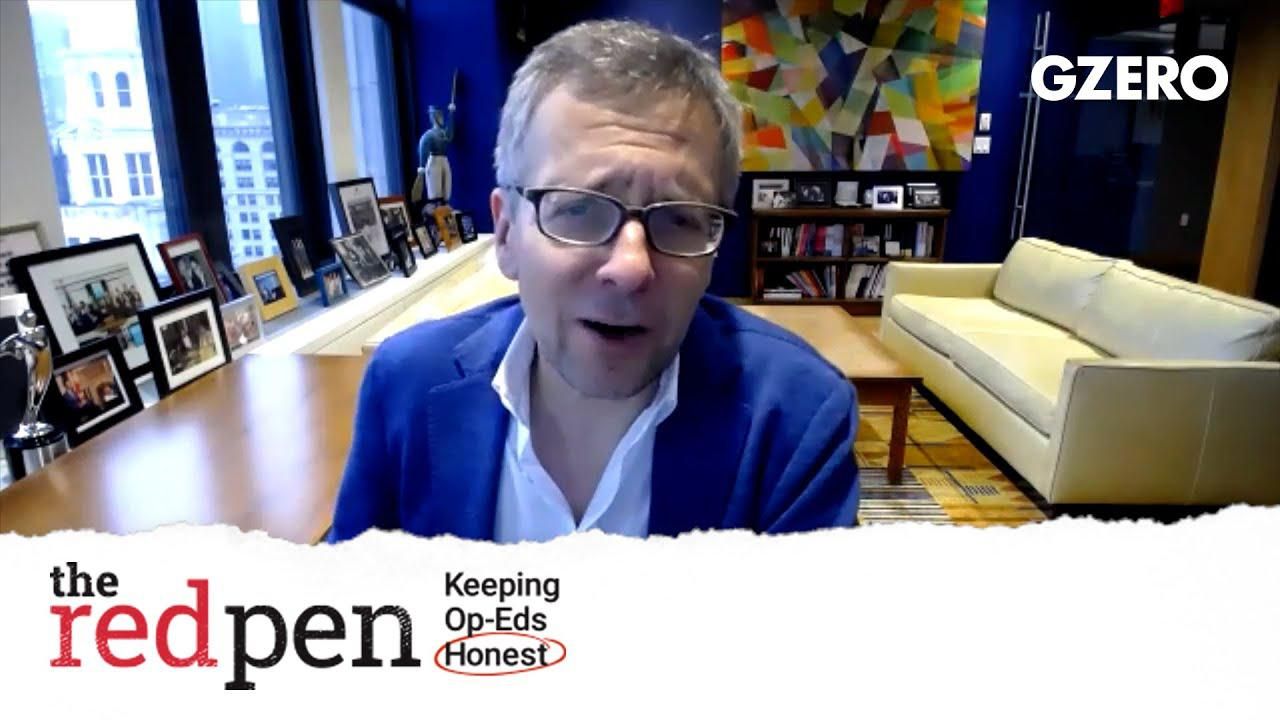The Red Pen
Would China really invade Taiwan?

Would China Really Attack Taiwan? | The Red Pen | GZERO Media

The cover story of The Economist declares that Taiwan is "The most dangerous place on Earth," because China might finally be ready to plan an invasion of the island. But are the consequences of such a move worth the many risks to China and its President Xi Jinping? Ian Bremmer breaks out the Red Pen to to explain why a US-China war over Taiwan is unlikely.
We are taking our red pen to a recent article from The Economist. The Economist, you ask, how could I? I love The Economist, I know, I know. But you'd lose respect if I give this piece a pass. In fact, it was the magazine's cover story this week, so I had no choice. The image and headline say it all. Here it is, Taiwan is now "the most dangerous place on earth" as US/China relations continue to sour in the opening months of President Biden's administration.
And it is true, of course, that the relationship between the two most powerful countries in the world, the US and China, is very rocky indeed. Back in March, a meeting between the US Secretary of State Tony Blinken and National Security Advisor Jake Sullivan and their counterparts from China got off to an icy start, in Anchorage, Alaska no less. The Biden administration has declared that China's treatment of Muslim minorities constitutes "genocide" and also continues to push back on the unilateral erosion from Beijing of Hong Kong's autonomy. So, this is not a good relationship.
Of all the issues, the most volatile and explosive could well be Taiwan. The Economist argues that China may finally look to capture the small island democracy.
And yes, there is a lot to be concerned about, but The Economist doesn't have it quite right.
So, let's get out the Red Pen.
First, a central point in the magazine's argument is that a Chinese attack on Taiwan would have global economic repercussions, including disrupting the world's most important semiconductor manufacturer, TSMC, that's Taiwan Semiconductor Manufacturing Company. That company makes more than half of all of the chips outsourced by all foreign companies globally. A quote from the piece: "Were production at TSMC to stop, so would the global electronics industry, at incalculable cost."
And yes, war would be devastating for many reasons, including the interruption of TSMC's operations. But that's precisely why it's not going to happen. China relies on a functional TSMC as much as the United States does for advanced semiconductors. In fact, China right now is way behind the US in this particular aspect, though not all, of the technology battle. Taiwan is a critical player in the great decoupling battle and an attack would seriously set back China's own tech ambitions.
The article also states that "China would overnight become the dominant power in Asia" if China attacked Taiwan and the United States didn't intervene.
That's doubtful. Actually, the "Quad," the US, Australia, India, and Japan, would be turbocharged overnight. China could completely undermine its own bid for regional dominance if it were to suddenly assault Taiwan. Also, the argument fails to acknowledge that Taiwan itself could mount significant military resistance, exposing weaknesses in Beijing's military power. Not to mention any such attack by China would further damage its ties to the European Union.
Finally, The Economist speculates that China's President Xi Jinping may want to "crown his legacy" as they say, with the takeover of Taiwan.
That is a huge gamble. What happens if Xi attempts an invasion and fails? His legacy would be defined by a reckless move that would destroy China's long-term strategic prospects.
Which brings us back to that very splashy and provocative cover and headline. Is Taiwan really "the most dangerous place on earth?" No. Or at least, not right now.
We've laid out a few of the reasons, but here a couple more: The Winter Olympics in Beijing, already super controversial as human rights groups call for boycotts based on abuses of Uighurs, Tibetans, and actions in Hong Kong. Beijing wants to avoid boycotts as much as possible, they see themselves as quite vulnerable in the upcoming Winter Olympics and attacking Taiwan would make matters far worse.
Also, President Xi is looking to secure a third term next fall. Remember, he ended term limits. A military attack on Taiwan could weaken China's standing if it fails. Xi's not likely to go there.
Still, there are other ways for China to assert greater control. For example, the very fear of a looming threat would likely erode Taiwan's quest for independence over time without any shots fired. How do the United States, the Quad, and Europe respond to that? The answer to that question is going to tell us a lot about where the GZERO world is heading.
That's your Red Pen for this week. Stay safe and we'll see you again here real soon.
1,170: The number of high-rise buildings in Kyiv that were left without heating following a barrage of Russian attacks last night on Ukraine’s capital and its energy facilities, per Kyiv Mayor Vitali Klitschko.
U.S. President Donald Trump and Japanese Prime Minister Sanae Takaichi hold up signed documents regarding securing the supply of critical minerals and rare earths, at a bilateral meeting at Akasaka Palace in Tokyo, Japan, October 28, 2025.
Representatives from the European Union, United Kingdom, Japan, and others will meet in Washington this week to discuss a strategic alliance on critical minerals.
80,000: The number of people estimated to be in the streets of Czechia on Sunday to show their support for President Petr Pavel after he blocked the nomination of an environmental minister who performed the Nazi salute and posted Nazi memorabilia.
The US has started handing $1,000 to the bank accounts of newborn babies. But can policies like this one help boost sagging birthrates in advanced democracies?